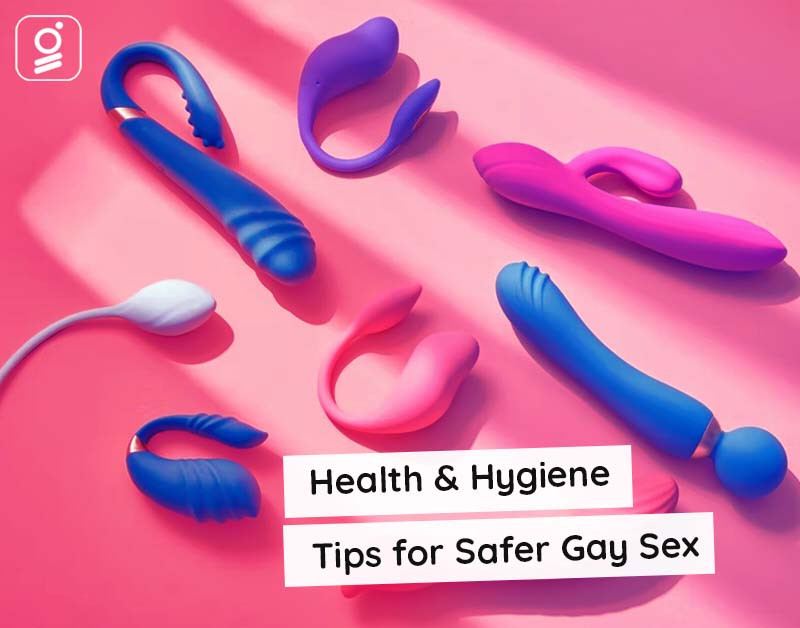When two men get it on, gay sex can be amazing — but only if you're careful to keep yourself and your partner safe from STDs and other unwanted complications.
Unfortunately, there's not nearly enough education out there when it comes to gay sex health & hygiene, so plenty of gay guys think they're invincible.
That's not the case! However, by following these seven tips for safer gay sex, you'll be able to have mind-blowing sex without risking your health or safety.
Use water-based lube

While silicone lubricant is fantastic for sex toys, it's easier to clean up using water-based lubrication during sexual activity. You can get whichever water-based lubrication you desire from a primary choice in your local drugstore aisle to a fancier one produced by your favourite sex toy brand. Just make sure it's not perfumed or flavoured!
You should make your partner aware of this before things become hot! They might have an adverse response while you're having sex if they're allergic to certain flavours and/or scents. That could be a real mood killer. It's better to use a lubricant that isn't flavoured or perfumed.
A word of caution: if you use condoms (which we hope you do! ), avoid using oil-based condoms — they will break down latex.
Wear condoms (or dental dams) for oral sex, rimming and anal sex
Perhaps most importantly, you should always wear a condom when having penetrative anal sex with a partner whose HIV status you don't know. At the bare minimum, condoms can help protect your body from bacteria and viruses that might otherwise enter through microscopic tears in your skin.
Always wear a condom for oral sex if you have any cuts or sores on your mouth or around your lips (like cold sores), so you don't pass any blood-borne diseases like herpes onto a partner during oral sex.
And, of course, use dental dams for rimming. These are thin sheets of latex placed over both partners' anuses or genitals during rimming to prevent transmission of STIs between partners.
Get tested for sexually transmitted infections (STIs) regularly—especially if you have unprotected sex or multiple partners.
Getting tested for STIs is important, regardless of whether you're in a relationship or having casual sex. Because one partner may be infected and not know it, or because one partner may not be honest about their sexual health status, there's no way to say with 100% certainty that your partner is free of infection.
The only way to ensure safety is through testing—and we recommend getting tested every six months if you're sexually active. If you test positive for an STI, talk to your doctor about treatment options.
Get vaccinated against Hepatitis A and B, which can cause liver damage or death in some cases. Both vaccines are recommended for all gay men who are HIV-negative and engage in risky behaviours like unprotected sex with multiple partners or using drugs intravenously.
Don't share sex toys without cleaning them first or using a condom on them.

It's good practice to clean sex toys before and after use. Suppose you have a toy you only use with one partner. In that case, you should consider sterilising it with rubbing alcohol between uses. That said, it's okay if that doesn't appeal to your aesthetic or sensual sensibilities. What's not okay is sharing sex toys without cleaning them first or using a condom on them.
This can lead to infections like gonorrhoea, chlamydia, syphilis, herpes and hepatitis B. These STIs are highly contagious and can be spread from person to person through bodily fluids such as blood, semen, and vaginal fluid.
While STIs aren't always curable (though some are treatable), they're all preventable with responsible sexual behaviour, including protecting yourself by using condoms when needed.
Keep your nails trimmed and clean.
Fingernails should be short enough so that they don't scratch or puncture your partner during sex. Dirty fingernails can also spread an infection from one person to another if one person scratches the other's skin during sex — especially if one partner has an open wound on his hands or fingers.
Nails can be a great way to transmit HIV and other STIs because they are frequently exposed to bodily fluids during sexual activity (allowing them to become infected). Nail-biting is also bad because it causes tiny cuts in your mouth, allowing bacteria from your mouth to enter your bloodstream through blood vessels under your tongue or gums.
Wash afterwards

The most common STD infections are bacterial, such as chlamydia, gonorrhoea, and syphilis. The only way to rid yourself of these infections is with antibiotics.
Still, there are two things you can do before visiting your doctor for a prescription.
First, wash any area on your body that comes into contact with a sexual partner's semen or blood following sex (this includes oral and anal sex). Second, abstain from sex until your symptoms subside if you think you have contracted an STD.
However, it's important to note that many STDs don't exhibit any symptoms. If you experience burning during urination or pain in your testicles, penis, anus, or mouth after having sex with someone new, visit your doctor immediately for testing and treatment.
Conclusion
If you're having sex with men, it's important not to skip a condom every once in a while. It's not just about sexually transmitted infections—it's also about staying healthy.
Whether you're sexual encounters always include condoms or a lot of them are condomless, it's still vital that you take care of yourself during sex.
By practising healthier habits, picking up a few helpful tips, and establishing smart sexual practices, you won't just be protecting your health but also protecting your partner(s). (Plus, hey, it's the responsible thing to do.)











